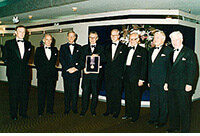
1985 Kyoto Prize Laureates
The Special Commemorative Kyoto Prize
/ Foundation
1900 -
Pursuing Health All over the World—International Cooperation of the Medical Science
1985
11 /11 Mon
Place:Kyoto International Conference Center
The Nobel Prizes, international awards first given in 1901, were initiated as the final request of Alfred Nobel, a Swedish chemist. Originally the prizes were established in the five fields of physics, chemistry, medicine and physiology, literature and peace. The Nobel Prizes symbolize the dignity of intellect of modern humankind in the 20th century as the ultimate standard for academic awards.
Donor: Alfred Bernhard Nobel
Total Fund: SEK 185,1 million (approx. 5.0 billion yen) (1984)
Chairman: Dr. Sune Bergström
Fields of the Nobel Prizes: Physics, Chemistry, Literature, Peace, Economic Sciences, and Physiology or Medicine
Cash Award: SEK 1.8 million each (approx. 49 million yen) (1985)
Prize Awarding Institutions:
The Nobel Prizes, international awards first given in 1901, were initiated as the will of Alfred Nobel, a Swedish chemist. The categories initially were in physics, chemistry, literature, peace and physiology or medicine. In 1969 the Swedish National Bank established a sixth award in economics as a memorial to Alfred Nobel. From these six categories over five hundred people have become Nobel laureates.
The Nobel Prizes, recognized as the most prestigious academic awards out of some two-thousand existing awards attained this high degree of authority and prestige after only eighty-five years in existence. This reflects a record which consists of a rigorous and impeccable selection process of its laureates with a nominating procedure that is unsurpassed in international composition.
The Nobel Prizes originated in 1901 as tribute to the intellect of modern man. During this century, which up to now has seen wars and revolutions, the Nobel Prizes have retained their aura for demanding excellence and thought in a world too often in turmoil. This is truly a miracle of our times.
At its inception, before World War I, the idea of awarding a prize for peace was truly remarkable. They foresaw the development of the natural sciences of this century and prizes were established in the three fields of physics, chemistry, and physiology or medicine. These have contributed to the well-being and salvation of mankind in the twentieth century. It is impossible to fully estimate their significance.
Furthermore, the establishment of the genre “Prize for Literature,” has led to increased public recognition of intellectual achievement in such fields as prose, poetry and philosophy, and may be said to have an inestimably significant role in the support of twentieth century intellectualism.
The Nobel Foundation is concerned with the administration of the Nobel Prizes, which in themselves have become the “universal language” of this century. The foundation has scrupulously fostered the prizes to their miraculously high current level or prestige and dignity.
The administrators of the international prizes representing Japan feel that, in consideration of the historical role played by the Nobel Prizes, there is no more deserving recipient for the special commemorative prize to be awarded in this, the inaugural year, than the Nobel Foundation.
Profile is at the time of the award.